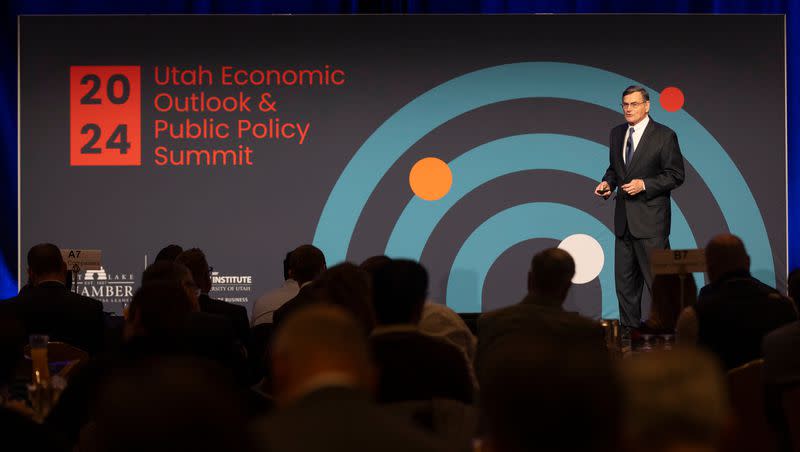Utah gov.: ‘The single greatest threat to our future prosperity is the price of housing’

Utah was ranked as the No. 1 economy in 2023 and the best state overall in the United States by U.S. News and World Report. It’s something that Utah leaders hope to maintain moving into 2024.
A crowd of nearly 1,000 business leaders and lawmakers gathered at the Grand America Hotel in Salt Lake City Friday morning for the state's annual Utah Economic Outlook & Public Policy Summit to discuss economic forecasting and public policy as the new year begins.
Throughout 2023, Utah maintained a robust economy and achieved its highest workforce engagement levels since 2010, according to the Gardner Policy Institute.
“While interest-rate-sensitive sectors like real estate, banking, and tech felt pressure, many other industries enjoyed healthy growth, including tourism, public construction, oil and gas extraction and health care,” the Gardner Policy Institute said in a press release.
Peter Cressy, the director of Executive Leadership Programs at the George Washington Leadership Institute, gave the keynote address, “Washington, Lincoln, Roosevelt, Churchill: A strategic approach to leading in times of crisis.”
“Washington and these other great leaders manifested eight common characteristics in leading during times of crisis and change, ranging from visibility and communication to planning and collaboration,” per the George Washington Leadership Institute.
Cressy explored the characteristics of these men and how their adversity continues to be applicable in today’s society.
Among the discussions Friday morning, was one topic that continues to draw attention — the issue of housing at the state and national levels.
“I think the single greatest threat to our future prosperity is the price of housing in our state,” Utah Gov. Spencer Cox said in his opening remarks.
“It’s happening in every state (and) is actually happening in almost every developed country in the world. But it’s especially acute here in the West because of our economic success,” he added.
According to a recent study published by Construction Coverage, purchasing a home in Salt Lake City is 116.3% more expensive than renting, making renting a much more economical option for residents.
For a long time, the average monthly expenses associated with purchasing a home, including sale prices, mortgage interest rates and property taxes, were significantly lower than the average rent costs in the U.S.
“But beginning in 2022, the combination of high home prices and high-interest rates tilted the scales in favor of renting,” researchers in the study found. “As of November 2023, the typical monthly payment for a home in the U.S. is now more than 22% higher than the typical monthly rent.”
Cox warned that if action isn’t taken to fix high housing costs, future generations will suffer the consequences:
“The American dream is dead if you cannot own a home. I believe that home ownership is central to everything that makes us prosperous, keeps us rooted, helps with our economy, helps with our culture, helps with our neighborhoods, everything that we value.”
Cox then asked the audience to imagine what the future of the United States would look like in 50 years after an entire generation had lived without owning a home. “I submit to you that is a very, very bleak picture,” he said.
Related
Phil Dean, chief economist and public finance senior research fellow at the University of Utah’s Kem C. Gardner Policy Institute, shared that what his team found in its economic report was that historically, Utah used to rank pretty close to the national average when it came to housing, but that is not the case anymore.
“If you compare us to the national average, we are very much on the high end,” Dean said, emphasizing that Utah is the seventh-ranked state in terms of single-family home prices.
He seconded Cox’s view on the effects high housing prices will have on future generations.
“This has pervasive implications for the economy as a whole,” Dean said. “It means they’re not going to have money to buy other things. ... It’s our young people, it’s those who aren’t current homeowners. We really need to take care of that.”
As one solution to the housing issue, Cox has proposed a path to building 35,000 starter homes in the next five years, an effort he called the “most aggressive plan in the United States right now.”
“As I’ve met with the League of Cities and Towns, I’ve met with mayors, city council members, legislators (and) builders. We can do this,” Cox said. “We can build 35,000 starter homes in this state in the next five years, reduce the price of housing and renew the American dream.”
The summit included panel discussions on economic priorities, the future of sports in Utah and what the state will look like in the decade ahead.

